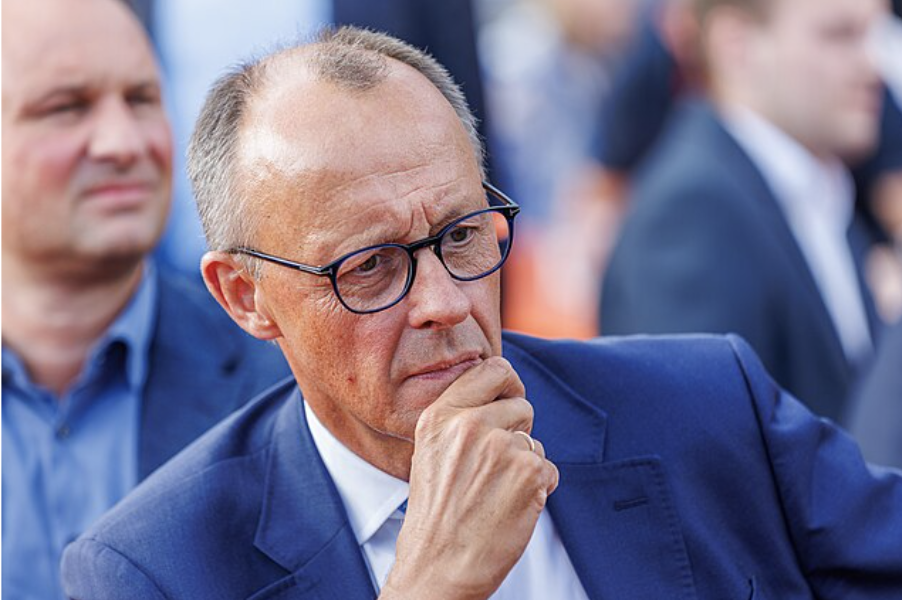Writer: Sophie Andrew
Editor: Alexis Taylor

Friedrich Merz at a CDU campaign event in Erfurt, 2024. Source: Wikimedia Commons
Introduction
Friedrich Merz has made military spending a national priority since being elected Chancellor of Germany in May, navigating new territory for many Germans fearful of war. A fear of Russian aggression is certainly not unique to Germany, however. This “Cold War Fever”, combined with an unreliable US ally, has triggered new defense investments across Europe.
While the UK continues to be a naval leader and France a nuclear powerhouse, Germany is presenting itself as the new symbolic and de facto leader of European defense after years of self-restraint. Large domestic investments, as well as its leadership in NATO and the European Commission, are rebranding Germany as Europe’s next military leader.
This article provides a concise overview of Germany’s historical stance on military spending, its recent responses to geopolitical instability, and concludes with the repercussions on domestic politics.
Historical Legacy and Restraint
Immediately after World War II, Germany was prohibited from building an army between 1945 and 1955. The Wehrmacht, Nazi Germany’s unified armed forces, was dissolved, and the Allied Control Council enforced strict demilitarization. Following 1955, the Federal Republic of Germany (FRG) officially reestablished its military, the Bundeswehr, as a member of NATO. However, the post-World War II order still placed Germany under heavy limitations, such as establishing armed forces for defensive purposes only, as stipulated in Article 87 of the Grundgesetz (Basic Law).
The FRG and the German Democratic Republic, which had been divided after WWII between Western and Soviet influence, unified again as one country in 1990. Since the end of the Cold War, Germany’s posture on borrowing and defense spending has been relatively shy. Following reunification in 1990, the Two Plus Four Treaty set a military personnel cap for the reunified Germany at 370,000 personnel, as well as enforced the renunciation of chemical and nuclear weapons. Military spending declined across Europe, and Germany’s spending hovered between 1.2% to 1.5% of GDP, below the 2% NATO benchmark. Having the US as an ally also created a cushion for European members, and now Merz even criticizes Europe for having been “free-riders.”
Responding to a New Geopolitical Landscape
A relatively relaxed period in the 1990s and 2000s was disrupted east of Germany with Russia’s annexation of Crimea in 2014. Tensions have been sharply rising since Russia invaded Ukraine in 2022, and especially after recent Russian airspace breaches in Lithuania, Romania, Poland, Denmark, and even Germany. German lawmakers are now responding with ambitious investments.
Merz’s EUR 500 billion defence and infrastructure bill, passed in March 2025, required a constitutional reform to the 0.35% debt brake (Schuldenbremse), which Germany had established after the 2008 financial crisis. Of that 500 billion, defense spending is projected to rise from €86 billion in 2025 to €153 billion by 2029. Merz is taking a gamble to fulfil his pledge to become “the strongest conventional army in Europe” by pushing the country out of the comfort of a fiscally conservative period.
At the NATO conference in The Hague, Merz also signalled Germany’s commitment to being a continental leader with the full support of Trump’s proposed 5% military spending from all members. The agreement follows that NATO members will increase defence expenditure to 3.5% of GDP for military equipment and an additional 1.5% for dual-use infrastructure, totalling 5%. In addition to new investments, Merz backed support for Ukraine and reaffirmed the application of Article 5.
Also representing Germany, EU Commission President Ursula von der Leyen’s State of the Union Address boldly announced the Ready 2030 initiative, which seeks to unlock €800 billion of defense investments by 2030. She also announced a drone alliance with Ukraine, supporting the implementation of a drone wall.
These recent policies have garnered attention and headlines, as the country repositions itself as a reliable military ally that can leverage being Europe’s strongest economy to support military expansion and leadership.
Domestic Response and Public Debate
Germany’s history has formed a complex national identity, which in its post-war era favoured restraint, stability and fiscal conservatism. However, growing concerns over wars and conflicts may break this mentality, with 82% of respondents in a recent survey identifying the breakout of war as a primary concern. This fear may explain the findings of another survey— conducted by German broadcaster ARD—which found that 66% of respondents support higher investment in defense and infrastructure. Even with security concerns, a bloc of fiscal conservatives—largely represented by the AfD—is opposed to public debt and is critical of Merz’s borrowing policies.
Merz must find a balance between security and fiscal stability without political pushback. Yet, the perceived necessity to defend Germany and Europe may increase his political popularity, as intense pressure from a narrow majority at home and escalating Russian aggression leave him with little room for failure.
